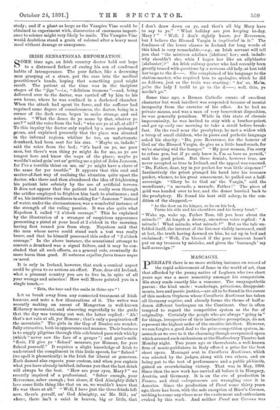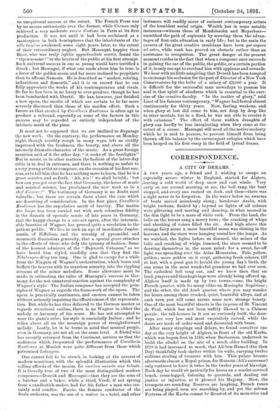MASCAGNI.
PERHAPS there is no more striking instance on record of the rapid achievement of fame in the world of art, than that afforded by the young native of Leghorn who two short years ago was a mere nonentity amongst his compatriots. His story reads exactly like a romance. The unsympathetic parent : the kind uncle : wanderings, privations, disappoint- ments, love and poetic justice,—are all to be found in the career of this modern Orpheus whose Cavalleria Rusticana has taken all Germany captive, and already forms the theme of half-a- dozen different burlesques on the Continent. One is often tempted to regard the competitive system as the foe of originality. Certainly the people who are always " going in" for things, irrespective of their instinctive promptings, do not represent the highest order of the creative intellect: However, we can forgive a good deal to the prize-competition system, in- asmuch as we owe to it the charming though overpraised opera which aroused such enthusiasm at the Shaftesbury Theatre last Monday night. Two years ago or thereabouts, a well-known firm of music-publishers in Italy offered a prize for the best short opera. Mascagni sent in Cavalleria Rusticana, which was selected by the judges, along with two others, and on being put to the test of performance and a public plebiscite, gained an overwhelming victory. That was in May, 1890. Since then the new work has carried all before it in Hungary, Austria, and Germany. It is on the eve of production in France, and rival entrepreneurs are wrangling over it in America. Since the production of Faust some thirty years ago, there has been, with the sole exception of Bizet's Carmen, nothing to come anywhere near the excitement and enthusiasm evoked by this work. And neither Faust nor Carmen was
an unequivocal success at the outset. The French Press was by no means enthusiastic over the former, while Carmen only achieved a very moderate succes d'estime in Paris at its first production. It was not until it had been acclaimed as a masterpiece in both hemispheres that the inhabitants of the villa lumiere awakened, some eight years later, to the extent of their extraordinary neglect. But Mascagni, happier than Bizet, who was truly infelix opportunitate mortis, found the " Open sesame !"to the hearts of the public at his first attempt. Such universal success in one so young would have terrified a Greek ; but Mascagni, if what one reads about him be true, is a lover of the golden mean, and far more inclined to propitiate than to affront Nemesis. He is described as " modest, retiring, industrious, and domestic," and it is on record that he can fully appreciate the works of his contemporaries and rivals. So far he has been in no burry to over-produce, though he has been bombarded with libretti. He has, however, just finished a new opera, the merits of which are certain to be far more severely discussed than those of his maiden effort. Such a furore as that created by Cavalleria Rusticana is often apt to produce a rebound, especially as some of the factors in this success may be regarded as entirely independent of the intrinsic merit of the piece.
It must not be supposed that we are inclined to disparage the new work. On the contrary, the performance on Monday night, though terribly rough in many ways, left us vividly impressed with the freshness, the beauty, and above all the intensely dramatic character of the music. As a great foreign musician said of it the other day, " it reeks of the footlights." But in music, as in other matters, the fashion of the latter-day critic is to deal in extremes, and there is nothing so unfair to a very young artist or composer, on the occasion of his first suc- cess, as to tell him that he has nothing more to learn, that he is a great maestro, and so forth. Ah, yes !' we shall be told ; but how can you get over the fact that Germany, the home of music and musical science, has proclaimed the new work to be a chef d'oeuvre ?' The testimony of Germany is no doubt most valuable ; but there are certain facts about the case which are deserving of consideration. In the first place, Cavalleria Rusticana has the superlative merit of brevity. The maxim Ars Tonga has been carried out with such relentless fidelity in the domain of operatic music of late years in Germany, that the happy change to a one-act opera, after the intermin- able beauties of Wagner, has proved quite a revelation to the patient public. We live in such an age of inordinate Jumbo- mania, of Eiffelism, and the worship of pyramidal and mammoth dimensions generally, that a special grace attaches to the efforts of those who defy the tyranny of fashion. Some of the keenest admirers of the " Bayreuth Colossus," as we have heard him styled, candidly own that they find the Nibelungen-Ring too long. One is glad to escape for a while from the Niagara of Wagner's orchestration, which beats and buffets the hearers with its ceaseless sonority, into the rippling streams of the minor melodists. Some allowance must be made, in estimating the value of Mascagni's success in Ger- many, for the not unnatural reaction against the complexity of Wagner's style. The Italian composer has accepted the prin- ciples of Wagner as regards the framework of the opera. The opera is practically continuous, and encores cannot be taken without seriously impairing the effectiveness of the representa- tion. But, while he has thus deferred to the German master as regards structural outline, there is no Wagner in either the melody or harmony of his score. He has not attempted to wear the giant's robe ; his style is essentially Italian ; and he relies above all on the sovereign power of straightforward melody. Lastly, let it be borne in mind that musical people, even in Germany,'are not all on the same level. A friend who has recently returned from the Continent, assures us that the audiences which frequented the performances of Cavalleria Rusticana at Munich were quite different from those which patronised Lohengrrn.
One cannot fail to be struck, in looking at the careers of modern musicians, with the splendid illustration which this calling affords of the maxim, La carriere ouverte aux talents.
It is literally true of two of the most distinguished modern composers—Dvorak and Mascagni—that they are the sons of a butcher and a baker, while a third, Verdi, if not sprung from a candlestick-maker, had for his father a man who cer- tainly sold candles. Faccio, the famous conductor of the Scala orchestra, was the son of a waiter in a hotel, and other instances will readily occur of eminent contemporary artists of the humblest social origin. Wealth has in some notable instances—witness those of Mendelssohn and Meyerbeer- smoothed the path of aspirants by securing them the advan- tages of first-rate education in early life ; but in the main the careers of the great creative musicians have been per aspera ad antra, while rank has proved an obstacle rather than an assistance to recognition. The great danger at the present moment resides in the fact that when a composer once succeeds in gaining the ear of the public, the public, or a certain portion of it, is only too apt to overload him with applause and rewards. We hear with no little misgiving that Dvorak has been tempted to exchange his. seclusion for the post of Director of a New York Conservatoire by the bribe of a salary of £3,000 a year. It is difficult for the successful man nowadays to possess his soul in that spirit of aloofness which is essential to the exer- cise of the creative faculty. "In the matter of glory," said Liszt of his famous contemporary, "Wagner had fasted almost continuously for thirty years. Now, fasting weakens, and when glory at last did come to him, not drop by drop like to other mortals, but in a flood, he was not able to receive it with calmness." The effect of these sudden draughts of glory can hardly be less intoTicating when they come at the outset of a career. Mascagni will need all the native modesty which he is said to possess, to prevent himself from being thrown off his balance by the extravagant eulogies which have been heaped on his first essay in the field of lyrical drama.



































 Previous page
Previous page